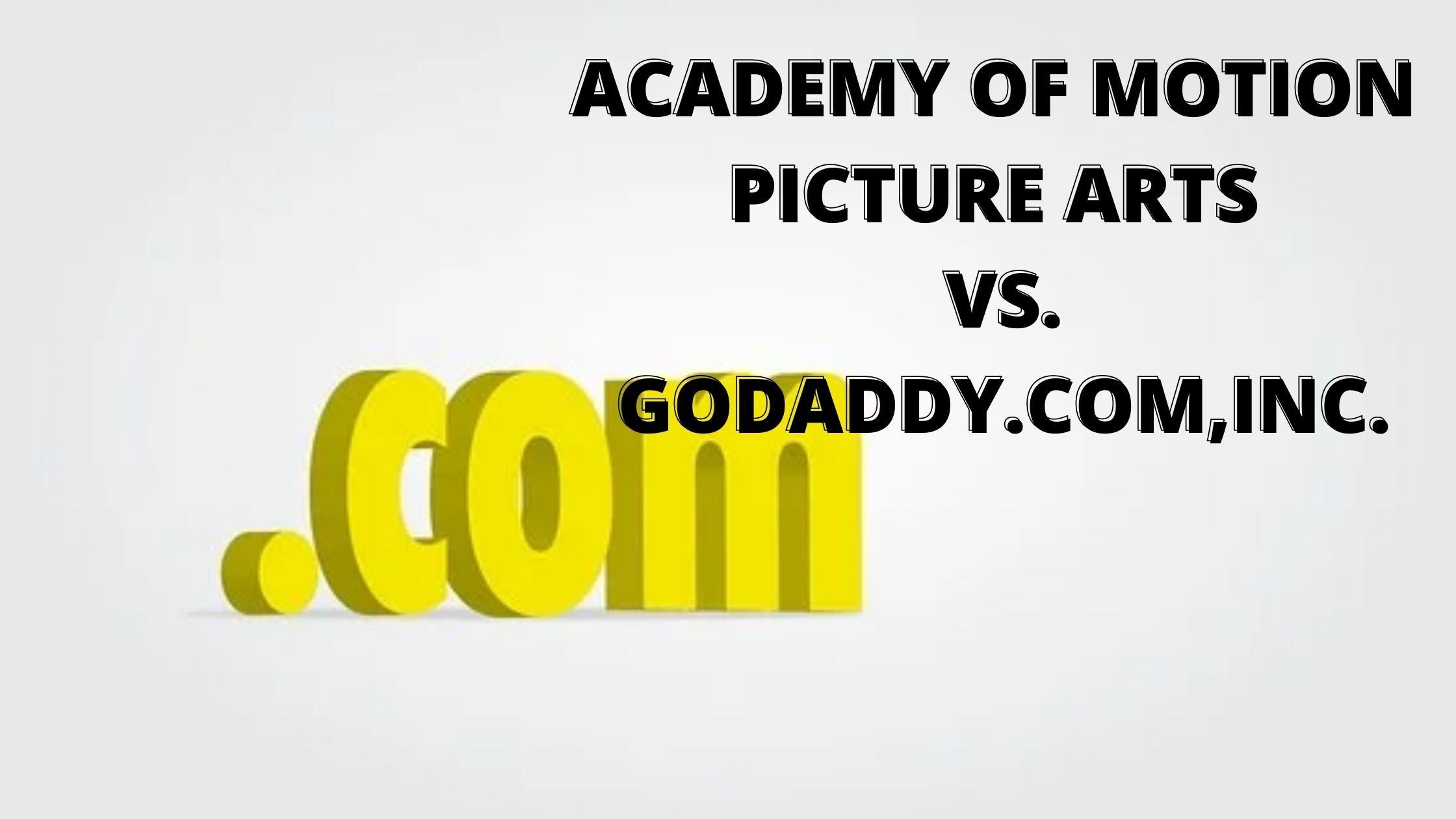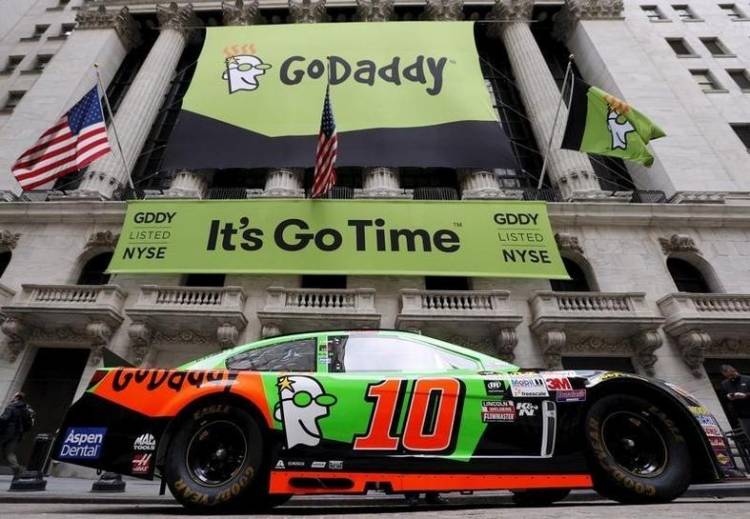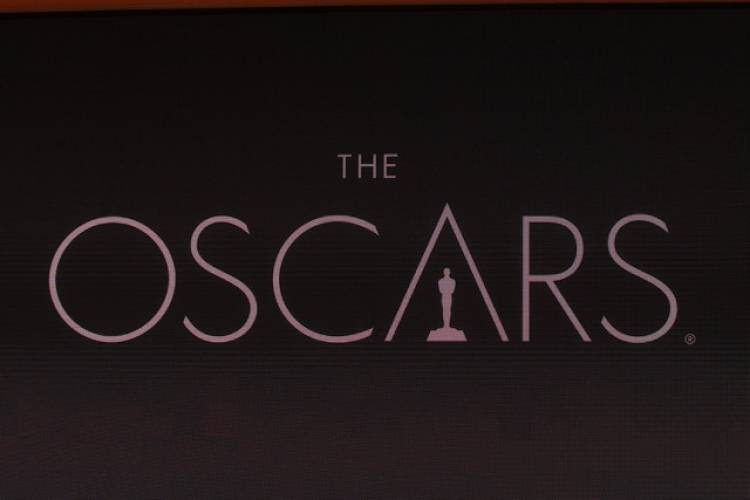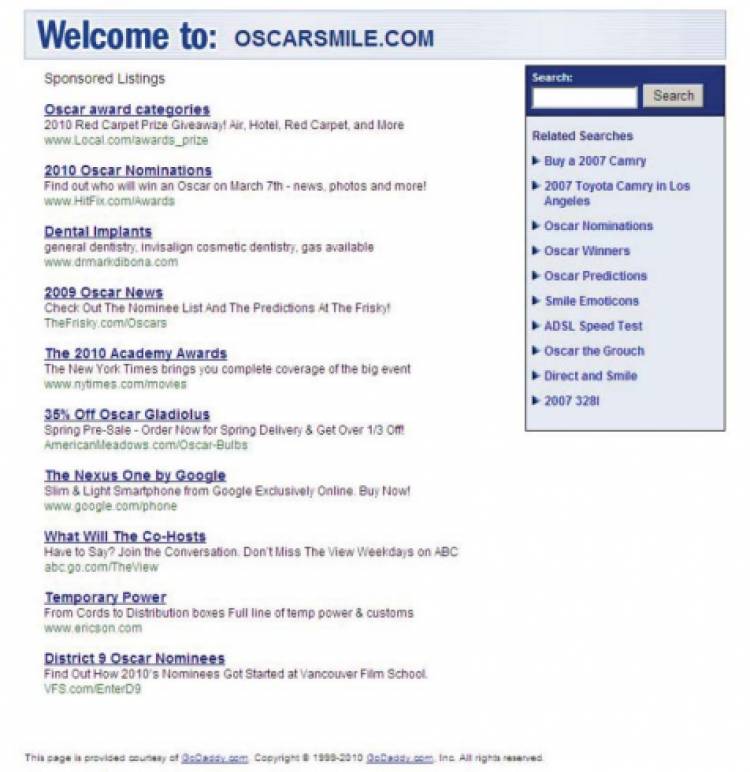ACADEMY OF MOTION PICTURE ARTS VS. GODADDY.COM, INC. Trademark Dispute
In 2010, the famously quarrelsome Motion Picture Academy sued GoDaddy for permitting a lot of "infringing" domains to be enlisted. As indicated by the Academy, anything that may use the word "Oscar" is heavily influenced by its, gratitude to a few registered trademarks. trademarks infringement doesn't fall under Section 230 protections, which is basically the only explanation this lawsuit figured out how to remain alive for five years

ACADEMY OF MOTION PICTURE ARTS
VS.
GODADDY.COM, INC.

Film Academy's Five-Year Quest to Make GoDaddy Pay For 'Infringing' Websites Ends in A Loss
In 2010, the famously quarrelsome Motion Picture Academy sued GoDaddy for permitting a lot of "infringing" domains to be enlisted. As indicated by the Academy, anything that may use the word "Oscar" is heavily influenced by its, gratitude to a few registered trademarks. trademarks infringement doesn't fall under Section 230 protections, which is basically the only explanation this lawsuit figured out how to remain alive for five years.

The lawsuit filed in 2010 focused on Go Daddy for permitting clients to purchase domains like 2011Oscars.com or betacademyawards.com, "park" that page and gather a part of the income from Go Daddy's promoting partners on a compensation for every snap premise.
On summary judgment at a previous stage, in this case, the Academy won in indicating that everything except 57 of 293 domains at issue was confusingly like their own trademarks. A preliminary trial was held at the beginning of August, and GoDaddy was essentially down to its last defense — that there was no dishonesty aim to profit.
Go Daddy's program barely brought in any cash. A domain like academyawardbuzz.com created only a couple hundred dollars in advertising revenue and under 50,000-page impressions altogether. In any case, it set off a case that endured a large portion of 10 years. Many considered this to be an experiment in the cybersquatting field.
In an incredible 129-page decision, Birotte spreads out his decision that "the unique circumstances compel a finding that GoDaddy did not possess the requisite bad faith intent to profit from the AMPAS Marks."

Those conditions included presentations made by the registrants; the automated nature of the registration process; GoDaddy's endeavors to help brand proprietors in securing their intellectual property rights; Google's authority over the pay-per-click ads showed on the sites being referred to; GoDaddy witness testimony; GoDaddy's close prompt end upon grievance; GoDaddy's later decision to filter Academy-related marks; and no proof GoDaddy elevated or directed people to the domains in the debate.
GoDaddy wins the hard-battled lawsuit that got pretty warmed from early endeavors to remove GoDaddy founder Bob Parsons, GoDaddy's allegation at one point that the Academy was gaming the legal system and exposures of AMPAS's different settlement offers including $20 million at the start and $6 million as of late as 2013.
In his decision, Judge Birotte also talks at different turns about the nominative reasonable utilization of brand names/trademarks, talking about how papers are loaded up with advertisements for "Academy Award Nominated" films.
"In spite, the Court finds that AMPAS has failed to meet its burden of proof on the dispositive inquiry of GoDaddy's bad faith intent to profit, the Court also finds in the substitute that GoDaddy has met its burden of proof on its related positive defense that it acted with a decent confidence conviction that its utilization of the domain was a fair use or otherwise lawful."
Towards the end of the lengthy ruling, the judge says there is a "fundamental problem" with the Academy's theory of liability under the Anti-Cybersquatting Consumer Protection Act. He states, “It confuses GoDaddy’s technical capacity to filter all trademarks with AMPAS’s legal duty to police its own trademarks. At its core, AMPAS’s ACPA claim would impose upon GoDaddy (and presumably any other company offering parking, hosting, or other basic internet services) the unprecedented duty to act as the internet’s trademark police. The ACPA did not impose such sweeping obligations."
The court finds that GoDaddy made significant good faith efforts to determine the issues drew out to its attention. Not exclusively did it proactively take promotions from offending domains, yet it founded extra watchword boycotts for future use. In any case, this wasn't adequate for the Academy, which actually accepted the only explanation anybody would use the word "Oscar" in a domain name was to siphon benefit away from the Academy.
The Academy since quite a while ago idea it had an open-and-shut case. That is such a misguided judgment frequently goes with expanded self-appreciation worth. To the Academy, "Oscar" just alludes to a certain thing. However, on the internet, it can mean a huge number of things – the greater part of them totally random to its yearly enlarged demonstration of self-salutation.
Taken in general, the five-year court battle highlighted a gigantic conflict of societies/cultures. The Academy Awards accepts that anything at all to do with its name represents a determined exertion to extort a million numbers of dollars, while GoDaddy as an organization that manages the more extensive web and a million web addresses scarcely enlists the Oscars present in their system.
The decision will without a doubt be appealed, yet there's not much in this decision that focuses on a more good result. The Academy tossed its weight around and expected that would be all it ever expected to do. It unsuccessful to give whatever supported up its cases that an internet entity was (once more) screwing an inheritance out of its "legitimate" income. GoDaddy, then again, demonstrated to the court it had done all that it could to help the Academy in its strange trademarks’ protection efforts and got expressed gratitude toward for its endeavors with five years of the suit.
BY-
Ananya Pandey
References:-
-
https://www.hollywoodreporter.com/thr-esq/film-academy-loses-godaddy-oscars-821998
-
https://www.scribd.com/document/281251902/Academy-v-GoDaddy-opinion-Oscar-cybersquatting-pdf












